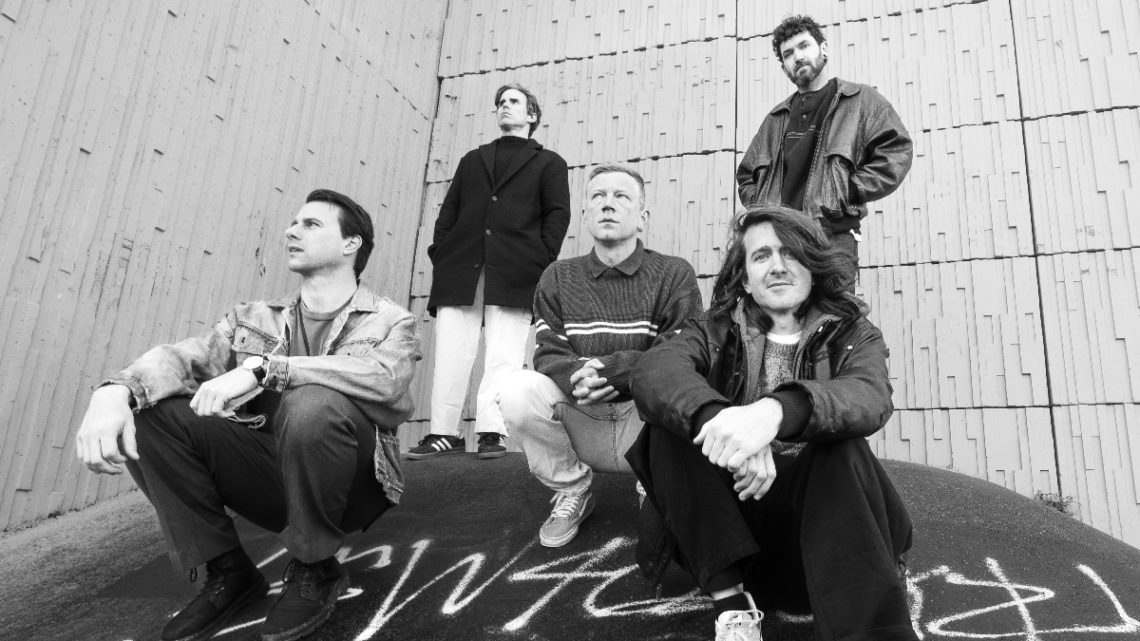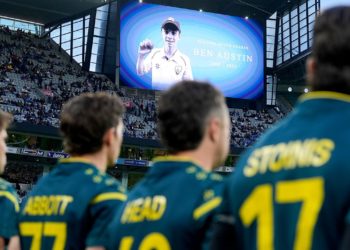Way back in 2005, when Warped Tour was 10 years strong but before Hot Topic changed its logo, Mayday Parade formed in Tallahassee, Florida. They Voltroned together from two existing Tallahassee bands, Kid Named Chicago and Defining Moment. Independently, they released their debut EP, Tales Told By Dead Friends, in 2006. That same summer, they were playing a Warped Tour date in Jacksonville, handing out CDs in parking lots. They quickly gained major label attention.
They signed to Fearless Records at the end of the summer. Their debut LP, A Lesson In Romantics, dropped in 2007. Almost immediately, Mayday Parade was catapulted to pop-punk stardom. They toured with All Time Low, Paramore, Every Avenue, The Maine, The Academy Is…, Motion City Soundtrack, and more genre contemporaries. Since then, they played Warped Tour eight times—in 2006, 2007, and 2008, then every two years from 2010 until 2018.
Mayday Parade’s Legacy Begins At a Warped Tour Stop In Jacksonville
With Warped Tour back for its 30th anniversary, Mayday Parade have returned to their roots. In June, they played the D.C. dates, and are slated to play Orlando in November. Reflection and nostalgia are big for Mayday Parade right now. They’re celebrating 20 years, sliding neatly into the annals of pop-punk history with so many other legacy bands of the time. While the kids today yearn for the 2000s-era emo/pop-punk scene they never had through festivals like When We Were Young, here’s a reminder that a lot of those bands are still alive and kicking.
Sure, it’s not the same as it was when any of these bands could still fit their entire fanbase in a basement instead of a sold out stadium. But the essence of the scene hangs around, shrouds the next wave of pop-punks in its familiar embrace.
This is what Mayday Parade are still holding onto, 20 years and counting into their career. With the October 3 release of the second installment of their anniversary trilogy album, Sad, they are basking in the warm light of nostalgia. The first part of the trilogy, Sweet, dropped in April. At its heart, it takes longtime fans back to what they first loved about Mayday Parade.
Mayday Parade Celebrate 20 Years With Reminiscent Trilogy of Albums
Mayday Parade kicked off their Three Cheers for Twenty Years Tour in April, concluding the U.S. leg in June. They played several dates in Australia, before ending the tour in the Philippines in September. This month, they’re hitting the road again as support for All Time Low. They’ve filled this role a few times over the past two decades.
“I feel like, as crazy as this sounds, putting together the set for all of this touring is like the first time for me that I feel like I’ve really stopped and looked back at everything that we’ve done,” says Mayday Parade vocalist Derek Sanders, speaking to me through Zoom. “We’ve always been just moving forward.”
I ask Sanders what it means to be in the same band for 20 years. How does it feel to still be in the position to make new music and tour, often alongside friends they’ve made during their career?
“Even when we started this band in 2005 and I was 19 years old, it was always ‘What is the next year [going to] look like? What are we doing? What are our goals?’” he says. Mayday Parade has certainly maintained this attitude of “constant moving forward,” says Sanders.
How To Move Forward While Still Looking Back
“This year it’s been really interesting to reflect and look back and build this set [while on tour],” he continues. “It’s pretty amazing everything that we’ve been able to do and the fact that we’re still here doing it and at the level that we are. These were the biggest headline shows that we’ve ever done, 20 years into this band. That’s just something that doesn’t happen a whole lot, I imagine. And the fact that it’s the five of us in the band [who] have been there since the very beginning is also super rare and something that I’m super proud of.”
That pride and gratitude also extends to longtime fans who continue to support their favorite band.
“It means so much to still be able to do this and still have people that care enough about us doing it to show up and listen to the new music,” Sanders says. “It’s incredibly humbling, and we’re super grateful.”
How The 20th Anniversary Trilogy Album Came Together
“We were in the studio,” Sanders says when asked how the new album came to be, “and what ended up becoming part one, Sweet, was originally supposed to be half of our next album. It would have been our eighth full length album, and the plan was to record seven or eight songs and then go in later and finish the album.
“And while were were in the studio, we kind of had the realization that, oh, this will be coming out in 2025, which is our 20-year mark as a band,” he continues. “We just kind of started thinking, what if we went for something a little bit bigger … or tried to do something a bit more grand than we’ve ever done before. We figured that collection of music we were recording, instead of being half of an album, would just be part one. And then we’d go in and do part two and part three, and obviously it’s a pretty ambitious project for us anyway, but it’s been really cool.”
Mayday Parade stepped out of their comfort zone for their celebratory trilogy. Sanders notes that, after so long, things start to feel like a pattern—”you write and record an album and put it out and tour for two years and then sort of repeat that cycle over and over again.”
Here, though, the band is balancing touring with so much new music. They’re attempting to celebrate their legacy but not become complacent in familiarity. But, more than that, “It’s a long period of time that’s exciting,” says Sanders, “and we have new stuff in the pipeline. It’s definitely exciting.”
The Theme of Mayday parade’s Trilogy is That There is No Theme
“It’s tough whenever you get into the studio and everyone’s ideas sort of come together,” Sanders admits, after I’ve asked him to break the trilogy down to its essential themes. This is both a difficult and a simple question—the easy answer is, it has no theme. The hard answer is, it has no theme.
“The strongest songs and the ones that everyone’s most excited about sort of make their way to the top and don’t always align with whatever the vision might have been,” says Sanders. “So I feel like they didn’t come out as themed as we had originally intended them to.”
Still, the songs are strong, he says, and the albums are solid. Overall, Mayday Parade is excited and proud of what they’ve created here.
“I feel like, to me, each [album] has a real sense of nostalgia to it,” he continues, “and I thin a lot of that probably has to do with us hitting this 20-year mark as a band and looking back for the first time ever. It’s kind of hard being in that mindset, to not create music that feels a bit nostalgic. So at its core that’s what I feel like I can pull the most from each of these releases, you know, they feel like Mayday Parade, and they feel like what we’ve continued to do, which is built upon our established sound and vibe.
“But [we’ve also tried] to push ourselves into a new direction as well,” he adds, “but with a real sense of nostalgia to these songs.”
Yeah Nostalgia is Cool, But What About When It Feels Weird?
Nostalgia can be a double-edged sword—one edge is super cool, but the other edge feels weird sometimes. It’s easy to get lost in the rose tint of the past, romanticizing things that really shouldn’t be romanticized. 2000s pop-punk had its warts, and occasionally there’s an aversion to discussing them out loud. Mayday Parade, meanwhile, acknowledges the double-edge of nostalgia while also celebrating it for what it is.
“There’s so much happiness and sadness to [nostalgia] at the same time,” says Sanders. “That’s a big part of all that when I’m at When We Were Young or Warped Tour or a lot of these things that feel like they’re heavily nostalgia-based. There’s this side of it that’s joyful and makes you happy, but there’s also this sort of sadness, I think, that’s a lot of where the rise of all this sort or comes from.
“Perhaps a lot of it has to do with, you know, the world continues to be more complicated and crazy,” he continues. “And thinking back to 20 years ago when everything just seemed a whole lot more simple and the future looked brighter. And music is just so powerful. The music that people were into at that time can really bring you back, and it kind of does that for a lot of people, more so than any other art form. There’s a whole lot to it, but we’re just happy to be a part of it in some way, for sure.”
Warped Tour Put Mayday Parade On the Map, But Would It Ever Feel The Same?
With the return of Warped Tour to celebrate its own anniversary, I ask Sanders about the differences between participating in 2006 for the first time and playing it now, in 2025, when it feels more like a festival than a tried and true tour.
“[Warped Tour] has so much to do with us sort of building a lot of momentum right out of the gate,” he says. “And then of course we played it six or seven times or whatever it was, and those were some of the best summers of my life. I feel like we owe a lot of our success to that tour.
“Obviously, yeah, it’s definitely different,” he adds, speaking about current Warped Tour. “Out of all the things that we’ve done as a band, Warped Tour is an extremely unique experience, whenever it was what it used to be, the full tour and everything. There’s really just nothing like it.
“And obviously we’re very stoked that they’re doing what they’re doing right now, but it feels more like a Riot Fest or When We Were Young. Just sort of any one of these big pop-punk festivals.”
New Warped Tour, Same Vibes
Really, there was no way Warped Tour could go back to its old formula; those days are in the past now.
“There’s no way to replicate that,” Sanders explains. “The grind of what Warped Tour was and being on the road, doing the whole North America tour, not knowing what time you’re going to play each day until the morning of. Which of course, they can’t really set it up that way when it’s just a one-off festival.”
The format may not be the same, but Sanders clarifies that the vibes were still there.
“Just in general,” he says, “the D.C. one, the vibes were great. It was [great] to be around a lot of those friends and people that we’ve known for so long and hadn’t seen for a long time. It feels really special to be there and be a part of it. But, yeah, it’s never going to be quite the same as what it was.”
Three Cheers For Twenty Years, And For Twenty More After That
Mayday Parade will most likely be releasing the currently unnamed third installment of their trilogy sometime next year. In 2007, they’ll celebrate the 20th anniversary of A Lesson In Romantics. Sanders says they might do a full album tour, which they did for the 10th anniversary. Or they might put a new spin on it, he’s not sure yet. There’s time to think about that, anyway.
For now, there’s When We Were Young coming soon, and Warped Tour in November. There’s also the support slot with All Time Low to look forward to. Sanders says this is a fun break from headlining. The band is excited to get on the road with their old pals (Sanders says there are always “really good vibes in the room” when they play with All Time Low).
“We’re all just feeling the love,” says Sanders near the end of our chat, “and the fact that we’re still here doing this is something that we’re incredibly grateful for. We try our best to put as much as we can into this, [but] it gets complicated the longer you do it.”
The guys in Mayday Parade all have families now, he says. There are things in their personal lives that can get in the way or cause setbacks. With such an unpredictable career path, things can get difficult quickly.
However, says Sanders, “It’s just kind of all good things. We’re happy to be here doing it … We kind of realize how that’s not always the case, and we’re grateful that it still is easy. We want to keep on working at it and have it make sense for as long as we can.”
Photo by Eli Ritter
The post From Warped Tour and Back Again: 20 ‘Sweet,’ ‘Sad’ Years of Mayday Parade (Exclusive) appeared first on VICE.




